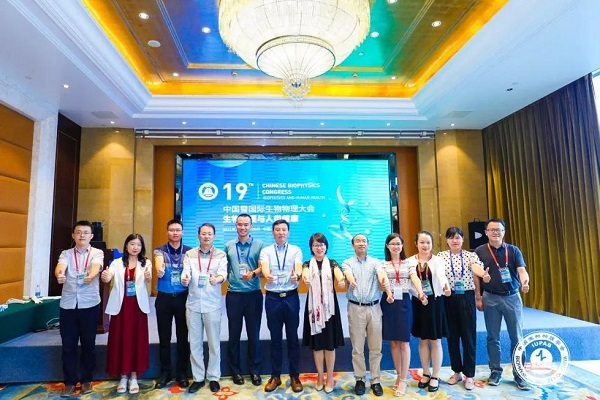Forum on sports and public health held at congress
Updated: 2021-09-06

Group photo at the forum on sports and public health in Hefei, capital of East China’s Anhui province on July 26
A forum on sports and public health was held during the 19th Chinese Biophysics Congress in Hefei city, East China's Anhui province on July 26. It was sponsored by the sports and public health subgroup of the Biophysical Society of China (BSC) and the key laboratory of the Ministry of Education for sports and fitness technology.
Professors Wang Ru from Shanghai University of Sport, Chen Ning from Wuhan Sports University and Ma Xindong from the Division of Sports Science and Physical Education of Tsinghua University co-chaired the forum.
The research team of Professor Di Qian from the Vanke School of Public Health, Tsinghua University proved the damaging effect of haze on the cognitive function of the body through experiments in mice and people.
At the same time, population follow-up and randomized controlled experiments have found that physical activity, especially done outdoors, is still beneficial to human health in hazy conditions. These studies have corrected the misconception that people should reduce outdoor physical activity in hazy weather.
Professor Song Zhiyin from the College of Life Sciences of Wuhan University, winner of the Hubei Outstanding Youth Fund, brought a report entitled "Mitophagy mediates the clearance of damaged mtDNA".
Song discovered that the key receptor ATAD3B mediates mitochondrial DNA clearance. Studies have found that under oxidative stress, ATAD3B is exposed from the inner mitochondrial membrane, and then interacts with LC3 to promote autophagy clearance of damaged mitochondria.
Further research found that the loss of ATAD3B may be closely related to the occurrence and development of MELAS encephalopathy. The above work has provided new potential intervention targets for mitochondrial diseases.
Researcher Xiao Han from Peking University Third Hospital, winner of the "Outstanding Youth" of the National Natural Science Foundation of China, gave a report on the protection of myocardium by exercise.
Xiao's research team used gene expression profiling chip detection technology to find that the myocardial damage and fibrosis caused by β-adrenaline-treated mice are closely related to IL-18-mediated inflammatory activation.
Dr Shi Zhe from the Institute of Mental Health, the Second Xiangya Hospital of Central South University, gave a report titled "Treatment of Alcohol Addiction". Shi and his collaborators discovered that the GABAB receptor system functions abnormally in the fifth layer of pyramidal neurons in the motor cortex of mice exposed to alcohol.
This study reveals that GABAB receptor function is an important regulatory factor and pharmacological target of motor impulsivity in alcohol addiction, and also provides an electrophysiological evaluation strategy for the use of non-invasive neuromodulation methods to interfere with the craving and impulsive behavior of patients with drug addiction.
Professor Li Zhonghan, deputy dean of the College of Life Sciences of Sichuan University and deputy director of the National and Local Joint Engineering Laboratory of Oral Regenerative Medicine, shared the latest research results on "Induced differentiation of mesenchymal precursor cells and repair of sports cartilage damage".
Associate Professor Yao Ting from Xi'an Jiaotong University shared the latest research results of transcription factor IRF4 regulating skeletal muscle glycogen metabolism.
The study revealed that IRF4 is an important regulatory molecule for the body's skeletal muscle exercise metabolism adaptation. It can regulate the reprogramming of skeletal muscle glycogen metabolism by inhibiting PTG and thus affect exercise capacity.
Professor Guo Liang from the Shanghai University of Sport (SUS) gave a report on theanine's promotion of browning of adipose tissue in mice and the improvement of exercise-mediated metabolism. The research provided new ideas and strategies for intervention against obesity and related metabolic diseases.
Kong Lingjie, associate professor from the Department of Precision Instruments, Tsinghua University, and host of the Youth Project of the National High-Level Talent Introduction Program, shared his latest research results in wearable optical sensors, which provide new strategies and methods for clinical diagnosis and evaluation of abnormal motion diseases such as Parkinson’s disease.
The conference was an academic feast in which everyone gained a deeper understanding of the field of sports and public health. The BSC Sports and Public Health Subgroup was established in 2019 with SUS Professor Wang Ru serving as president.
